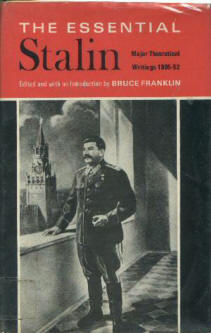 CONTENTS
CONTENTS
The Proletarian Class and the Proletarian Party (1905)
Armed Insurrection and Our Tactics ( 1905)
From: Marxism and the National Question ( 1913)
Two Camps ( 1919)
The Foundations of Leninism ( 1924)
Concerning the Question of the Proletariat and the
Peasantry ( 1925)
Notes on Contemporary Themes: China (1927)
Organise Mass Criticism from Below ( 1928)
Report to the Seventeenth Congress of the Communist Party of the Soviet Union
(Bolshevik) on the Work of the Central Committee ( 1934)
I. The Continuing Crisis of World Capitalism and the External Situation of
the Soviet Union
1. The Course of the Economic Crisis in the Capitalist Countries
2. The Growing Tension in the Political Situation in the Capitalist Countries
3. The Relations Between the U.S.S.R and the Capitalist States
II. The Continuing Progress of the National Economy and the Internal Situation
in the U.S.S.R.
1. The Progress of Industry
2. The Progress of Agriculture
3. The Rise in the Material and Cultural Standard of the Working People
4. The Progress of Trade Turnover, and Transport
III. The Party
1. Questions of Ideological and Political Leadership
2. Questions of Organisational Leadership
Dialectical and Historical Materialism ( 1938)
Report to the Eighteenth Congress of the Communist Party of the Soviet Union
(Bolshevik) on the Work of the Central Committee ( 1939)
I. The Soviet Union and International Affairs
New Economic Crisis in the Capitalist Countries. Intensification of the Struggle
for Markets and Sources of Raw Material, and for a New Redivision of the World.
Increasing Acuteness of the International Political Situation. Collapse of the
Postwar System of Peace Treaties. Beginning of a New Imperialist War.
The Soviet Union and the Capitalist Countries
II. Internal Affairs of the Soviet Union
1. Further Progress of Industry and Agriculture
2. Further Rise in the Material and Cultural Standard of the People
3. Further Consolidation of the Soviet System
III. Further Strengthening of the C.P.S.U.(B.)
1. Measures to Improve the Composition of The Party. Division of Organisations.
Closer Contact between the Leading Party Bodies and the Work of the Lower
Bodies.
2. Selection, Promotion and Allocation of Cadres
3. Party Propaganda. Marxist-Leninist Training of Party Members and Party
Cadres.
4. Some Questions of Theory
The Twenty-sixth Anniversary of the October Revolution ( 1943)
I. A Year of Radical Turn in the Course of the War
II. Nationwide Assistance to the Front
III. Consolidation of the Anti-Hitler Coalition.
Disintegration of the Fascist Bloc. Marxism and Linguistics ( 1950)
I. Concerning Marxism in Linguistics
II. Reply to Krasheninnikova
III. Reply to Sanzheyev
IV. Reply to D. Belkin and S. Furer
V. Reply to A. Kholopov
Economic Problems of Socialism in the U .S.S.R. (1952)
Remarks on Economic Questions Connected with the November 1951 Discussion
Character of Economic Laws Under Socialism
Commodity Production Under Socialism
The Law of Value Under Socialism
Abolition of the Antithesis Between Town and Country, and Between Mental Labour
and Physical Labour, and Elimination of Distinctions Between Them Disintegration
of the Single World Market and Deepening of the Crisis of the World Capitalist
System
Inevitability of Wars Between Capitalist Countries
The Basic Economic Laws of Modem Capitalism and of Socialism
Other Questions
International Importance of a Marxist Textbook on Political Economy
Ways of Improving the Draft Textbook on Political Economy
Reply to Comrade Alexander Ilyich Notkin From: Concerning the Errors of
Comrade L. D. Yashenko
I. Comrade Yaroshenko's Chief Error
II. Other Errors of Comrade Yaroshenko
Speech to the Nineteenth Congress of the Communist Party of the Soviet Union
(1952)
R- D